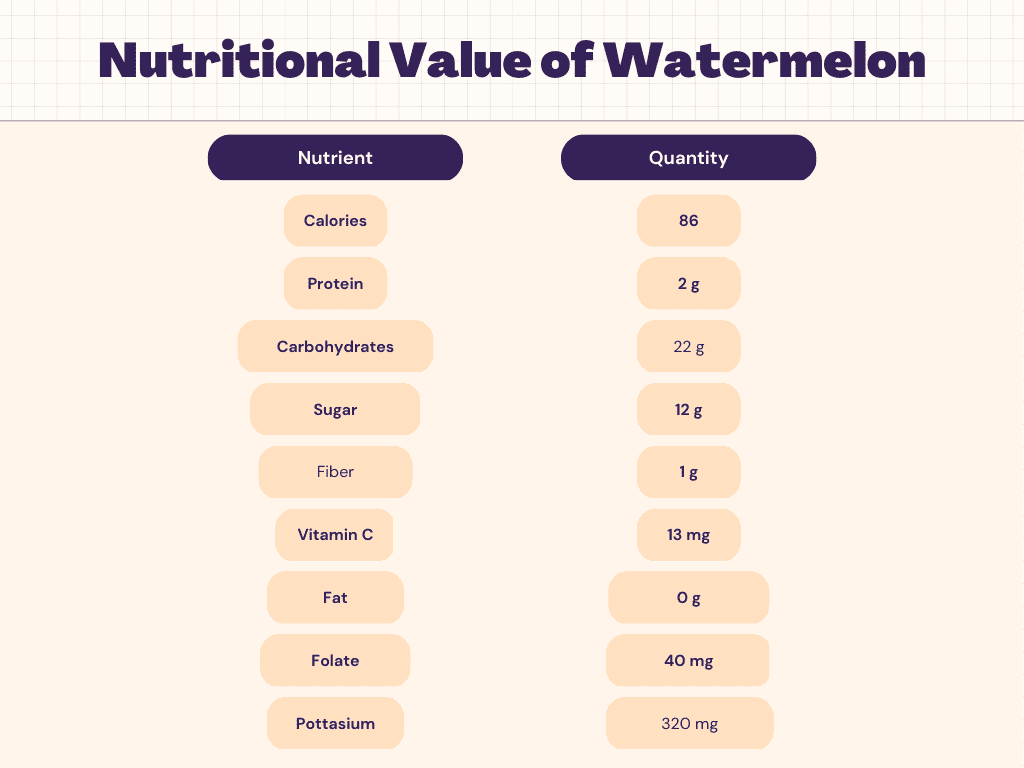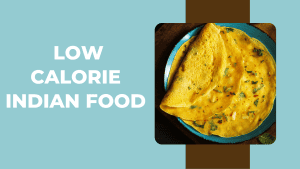Watermelon is a sweet and refreshing low-calorie summer snack. It provides hydration and essential nutrients including vitamins, minerals, and antioxidants. Since 90% of watermelon’s weight is water, it is one of the best fruits to eat when trying to lose weight. A portion of 100 grams contains only 30 calories. It’s also an excellent source of an amino acid called arginine, which has been shown to help burn fat quickly.
Nutritional Value of Watermelon
Nutritional Facts of Watermelon
Carbs
Carbohydrates in watermelon are mostly low-fiber sugars. Half of the sugar is fructose, a quarter is glucose, and less than a quarter is sucrose, with the remaining sugars making up only a small portion.1 If you’re counting carbs, it’s best to measure watermelon carefully.
Fats
Watermelon contains almost no fat, so it is similar to other melons, such as melons or honeydew. The fat present is mainly polyunsaturated (0.076 grams), with smaller amounts of monounsaturated (0.056 grams) and saturated (0.02
grams) fatty acids.
Protein
Watermelon is very low in protein, just under 1 gram per cup. Interestingly, some companies produce watermelon seed protein by sprouting and peeling the seeds. However, such protein cannot be obtained from fresh seeds, because the seed coat prevents the protein inside from being digested.
Health Benefits of Watermelon
Helps in increasing Health Heart – Watermelon is rich in an amino acid called citrulline, which can help transport blood throughout the body and lower blood pressure. Your heart will also enjoy the benefits of all the lycopene in watermelon. Studies show that it can reduce the risk of a heart attack.
Helps protect your joints – Watermelon contains a natural pigment called beta-cryptoxanthin, which can protect joints from inflammation. Some studies show that over time it can reduce the chance of getting RA.
Helps with Diabetes – Watermelon has a glycemic index (GI) of 80, which is about the same as a bowl of cornflakes. But it is low in carbohydrates. This means that its glycemic load (how quickly it enters the bloodstream and how much glucose it can produce) is only 5. Check our Diabetes Plans for more information.
Helps in soothing your Skin – Watermelon vitamins A, B6, and C help the skin stay soft, smooth, and elastic. Since melon is full of water, it also makes a great face mask.
Vitamins & Minerals in Watermelon
A fully ripe red watermelon contains more nutrients than a less ripe watermelon. One serving of watermelon is a good source of vitamins C and A, providing a significant part of the daily requirement.
Vitamin C helps with wound healing and may have anti-aging and immune-boosting properties, while vitamin A is important for eye health. One cup of watermelon also provides about 7% of the daily need for copper and pantothenic acid.
Bottom Line
Watermelon is a great source of the amino acid citrulline and the antioxidant lycopene, which play a very important role in your body. It has a very high water content and provides nutrients such as lycopene, citrulline, and vitamins A and C. Research shows that this sweet red melon can even improve heart health, and reduce muscle pain and inflammation, although more research is needed.
FAQs
How many Watermelons can I eat in a day?
There is no official upper limit for watermelon consumption. If you do not use other fruits, try to limit your intake to 2 cups (300 grams) a day.
Should I eat a Watermelon before or after exercise?
If you exercise outside, eating juicy watermelon before or after your workout will help hydrate you and give you energy. It also contains potassium, an important electrolyte lost in sweat. In addition, watermelon contains an amino acid called l-citrulline, which can reduce muscle soreness after intense exercise.
What are the benefits of Watermelon?
- Helps in fighting Dehydration
- Helps in the reduction of Blood Pressure
- Helps in the prevention of Cancer
- Helps in weight loss
- Helps in easing of Muscle Fatigue
What is the best time to eat a Watermelon?
The best time to eat watermelon is between 10 and 12 in the morning, for breakfast or between breakfast and lunch. You can also enjoy it as an evening meal, before 5 pm. Do not use it at night or with food.










